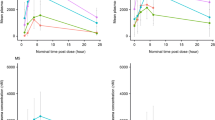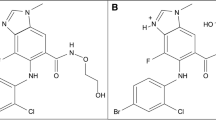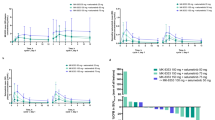Abstract
Purpose: A phase I clinical trial in patients with advanced carcinomas was conducted using the orally available neurotrophin receptor-linked tyrosine kinase receptor inhibitor, CEP-701. The objectives were to determine the maximum tolerated dose (MTD), dose-limiting toxicities, and pharmacokinetic profile of this orally administered agent. Patients and methods: A total of 30 patients were accrued to receive escalating BID doses of CEP-701 in cycles lasting 28 days. Between 3 and 6 patients were enrolled at each dose level. Once the MTD was determined, nine de novo patients were recruited to receive that level of drug. Pharmacokinetic studies were performed after the first dose, with additional sampling to assess intraindividual variability. Results: The dosages ranged from 5 mg BID to 160 mg BID. While the criteria for MTD were not met at the dose levels administered, DLTs were observed at 80 and 120 mg BID. Treatment related adverse events, especially of the gastrointestinal system, made CEP-701 poorly tolerated at dosages above 40 mg BID. While CEP-701 did not produce an objective tumor response in any patient, 7 of the 30 patients received treatment for 3 months or more, including 3 who were on study with stable disease for more than 6 months. Orally administered CEP-701 was rapidly absorbed, with a mean t max between 1 and 3 hours. At higher dose levels, serum drug levels showed greater than dose-proportional increases by Day 28 versus Day 1. Conclusion: CEP-701 40 mg BID was well tolerated by patients with advanced malignancy and is the recommended dose level for planned phase II trials. Further study is necessary to determine the clinical efficacy of this novel new chemotherapeutic agent.
Similar content being viewed by others
References
Segal RA, Greenberg ME: Intracellular signaling pathways activated by neurotrophic factors. Annu Rev Neurosci 19: 463-489, 1996
Shibayama E, Koizumi H: Cellular localization of the trk neurotrophin receptor family in non-neuronal tissues. Am J Pathol 148: 1807-1818, 1996
Pflug BR, Dionne C, Kaplan DR, Lynch J, Djakiew D: Expression of a Trk high affinity nerve growth factor receptor in the human prostate. Endocrinology 136: 262-268, 1995.
Oelmann E, Sreter L, Schuller I, Serve H, Koenigsmann M, Wiedenmann B, Oberberg D, Reufi B, Thiel E, Berdel WE: Nerve growth factor stimulates clonal growth of human lung cancer cell lines and a human glioblastoma cell line expressing high affin-ity nerve factor binding sites involving tyrosine kinase signaling. Cancer Res 55: 2212-2219, 1995
Bongarzone I, Pierotti MA, Monzini N, et al: High frequency of activation of tyrosine kinase oncogenes in human papillary thyroid carcinoma. Oncogene 4: 1457-1462, 1989
Donovan MJ, Hempstead B, Huber LJ, et al: Identification of the neurotrophin receptors p75 and trk in a series of Wilms' tumors. Am J Pathol 145: 792-801, 1994
Miknyoczki SJ, Lang D, Huang L, Klein-Szanto AJP, Dionne CA, Ruggeri BA: Neurotrophins and trk receptors in human pancreatic ductal adenocarcinoma: Expression patterns and effects on in vitro invasive behavior. Int J Cancer 81: 417-427, 1999
Matsumoto K, Wada RK, Yamashiro JM, Kaplan DR, Thiele CJ: Expression of brain-derived neurotrophic factor and p145TrkB affects survival, differentiation, and invasiveness of human neuroblastoma cells. Cancer Res 55: 1798-1806, 1995
Koizumi H, Morita M, Mikami S, Shibayama E, Uchikoshi T: Immunohistochemical analysis of TrkA neurotrophin receptor expression in human non-neuronal carcinomas. Pathol Inter 48: 93-101, 1995
Djakiew D: Role of nerve growth factor-like protein in the paracrine regulation of prostate growth. J Androl 13: 476-487, 1992
Dalal R, Djakiew D: Molecular characterization of neurotrophin expression and the corresponding tropomyosin receptor kinases in epithelial and stromal cells of the human prostate. Mol and Cell Endocrin 134: 15-22, 1997
Dionne CA, Camoratto AM, Jani JP, Emerson E, Neff N, Vaught JL, Murakata C, Djakiew D, Lamb J, Bova S, George D, Isaacs JT: Cell cycle-independent death of prostate adenocarcinoma is induced by the trk tyrosine kinase inhibitor CEP-751 (KT6587). Clin Can Res 4: 1887-1898, 1998
Djakiew D, Pflug BR, Delsite R, Onoda M, Lynch JH, Arand G, Thompson EW: Chemotaxis and chemokinesis of human prostate tumor cell lines in response to human prostate stromal cell secretory proteins containing nerve growth factor-like protein. Cancer Res 53: 1416-1420, 1993
Marchetti D, McQuillan DJ, Spohn WC, Carson DD, Nicolson GL: Neurotrophin stimulation of human melanoma cell invasiveness: Selected enhancement of heparanse activity and heparanase degradation of specific heparan sulfate subpopulations. Cancer Res 56: 2856-2863, 1996
Geldof AA, DeKleijn MAT, Rao BR, Newling DWW: Nerve growth factor stimulates in vivo invasive capacity of DU 145 human prostatic cancer cells. J Cancer Res Clin Oncol 123: 107-112, 1997
Martin-Zanca D, Hughes SH, Barbacid M: A human oncogene formed by the fusion of truncated tropomysin and protein tyrosine kinase sequences. Nature 319: 743-748, 1986
George DJ, Suzuki H, Bova GS, Isaacs JT: Mutational analysis of the trkA gene in prostate cancer. Prostate 26: 172-180, 1998
Berg MM, Stenberg DW, Parada LF, Chao MV: K-252a inhibits nerve growth factor-induced trk proto-oncogene tyrosine phosphorylation and kinase activity. J Biol Chem 267: 13-16, 1992
Ohmichi M, Decker SJ, Pang L, Saltiel AR: Inhibition of the cellular actions of nerve growth factor by staurosporine and K252a results from the attenuation of the activity of the trk tyrosine kinase. Biochemistry 31: 4034-4039, 1992
Akinaga S, Ashizawa T, Gomi K, Ohno H, Morimoto M, Mukakata C, Okabe M: Antitumor effect of KT6124, a novel derivative of protein kinase inhibitor K-252a, and its mechanism of action. Cancer Chemother Pharmacol 2: 266-272, 1992
Hudkins RL, Iqbal M, Park CH, Goldstein J, Herman JL, Shek E, Murakata C, Mallamo JP: Prodrug esters of the indolocar-bazole CEP-751 (KT-6587). Biorg Med Chem Ltrs 8: 1873-1876, 1998
Camoratto AM, Jani JP, Angeles TS, Maroney AC, Sanders CY, Murakata C, Neff NT, Vaught JL, Isaacs JT, Dionne CA: CEP-751 inhibits trk receptor tyrosine kinase activity in vitro and exhibits anti-tumor activity. Int J Cancer 72: 673-679, 1997
Evans AE, Kisselbach KD, Yamashiro DJ, Ikegaki N, Camoratto AM, Dionne CA, Brodeur GM: Antitumor activity of CEP-751 (KT-6587) on human neuroblastoma and medulloblastoma xenografts. Clin Cancer Res 5: 3594-3602, 1999
George DJ, Dionne CA, Jani J, Angeles T, Murakata C, Lamb J, Isaacs JT: Sustained in vivo regression of Dunning H rat prostate cancers treated with combinations of androgen ablation and trk tyrosine kinase inhibitors, CEP-751 (KT-6587) or CEP-701 (KT-5555). Cancer Res 59: 2395-2401, 1999
Miknyoczki SJ, Chang H, Klein-Szanto A, Dionne CA, Ruggeri BA: The trk tyrosine kinase inhibitor CEP-701 (KT5555) exhibits significant antitumor efficacy in preclinical xenograft models of human pancreatic ductal adenocrcinoma. Clin Can Res 5: 2205-2212, 1999
Smith BD, Levis M, Beran M, Giles F, Kantarjian H, Berg K, Murphy KM, Dauses T, Allebach J, Small D: Single-agent CEP-701, a novel FLT3 inhibitor, shows biologic and clinical activity in patients with relapsed or refractory acute myeloid leukemia. Blood 103: 3669-3676, 2004
Author information
Authors and Affiliations
Rights and permissions
About this article
Cite this article
Marshall, J.L., Kindler, H., Deeken, J. et al. Phase I trial of orally administered CEP-701, a novel neurotrophin receptor-linked tyrosine kinase inhibitor. Invest New Drugs 23, 31–37 (2005). https://doi.org/10.1023/B:DRUG.0000047103.64335.b0
Issue Date:
DOI: https://doi.org/10.1023/B:DRUG.0000047103.64335.b0




